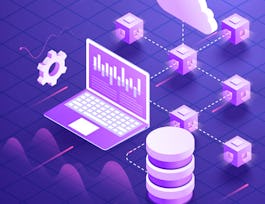获得您的学位
最受欢迎的课程
最受好评的课程
在 12 小时或更短时间内完成 Data Management 课程
开启你的职业生涯
最受欢迎的证书
更多 Data Management 课程
关于 数据管理 的常见问题
Data is a massively valuable asset for businesses today, and data management is the process by which this resource is collected, organized, stored, and accessed. Data management and proper data integration is thus a critical part of IT systems, as it informs operational decision-making and strategic planning at the highest levels of an organization.
Database administration via database management systems (DBMS) is one of the chief responsibilities for professionals in this field, which must be effectively integrated with data pipelines, data warehouses, and other data infrastructure that collects, cleans, and delivers data at scale. Data managers are also increasingly responsible for data governance, ensuring data privacy and data protection in compliance with corporate policies as well as regulations such as GDPR.
Data management professionals can come from diverse educational backgrounds, such as computer science, business administration, or mathematics and statistics. Their most important skills are organizational and interpersonal; they need to be able to methodically collect, organize, and analyze large datasets while also communicating their relevance to both technical (i.e. data engineers) and non-technical (i.e. C-suite decision-makers) audiences.
Data managers also need strong computer science skills. That includes proficiency in programming languages such as Python and Java, database systems such as SQL and NoSQL, and operating systems such as UNIX and LINUX. As more and more business computer services move to the cloud, data management professionals increasingly must know how to work with cloud computing platforms like Azure, IBM Cloud, and Google Cloud.
In today's era of big data, data management careers are a big opportunity for growth. For example, according to the Bureau of Labor Statistics, database administrators had a median annual salary of $90,070 in 2018, and these jobs are expected to grow by 9% over the next decade - faster than the average for the economy overall.
There are a wide range of roles using data management skills besides database administrator. Businesses may hire specifically for data managers, data management specialists, and IT project managers to build and maintain their data systems. On the more technical side, data scientists and data engineers are responsible for building the data infrastructure needed to collect large datasets efficiently. And data mining analysts, operations analysts, and systems analysts use their expertise to turn these datasets into actionable business insights.
无论您是刚入行的新手还是需要更新技能以适应云计算时代的资深专业人员,在线学习都是发展数据管理技能的好方法。Coursera 提供来自宾夕法尼亚大学、明尼苏达大学等顶尖大学以及 Google Cloud、IBM、Cloudera 和 MongoDB 等公司的专业证书、MasterTrack 证书、专项课程、指导项目和数据管理课程。数据管理方面的一些热门课程包括 Bigquery、MongoDB 和大数据分析。
If you want to learn about data management within the context of a full Computer Science Degree Program, Coursera also offers bachelors and masters degrees from top-ranked schools like University of Illinois, Arizona State University, and Imperial College London. Whatever your goals are, online courses allow you to learn on a flexible schedule from anywhere in the world.
在开始学习数据管理之前,您通常至少应掌握基本的计算机技能,如如何使用窗口系统以及如何剪切、复制和粘贴文本。 在学习一些数据管理概念时,较强的阅读和数学能力也很有用。 此外,熟悉电子表格也有帮助,电子表格可用于存储大量数据和组织数据集,以便于分析和管理。 学习过金融技术、Google Docs、Google Slides 和业务系统分析的基础概念也会有所帮助。
喜欢使用计算机技术执行复杂任务的人通常最适合数据管理方面的工作。 这是因为大公司可以收集大量数据,然后由数据管理人员将这些数据整理成可用的数据集,进行存储,并在需要时进行检索。 进入这一领域的人通常还具有很强的批判性思维和分析能力。 高度的组织性是适合数据管理职业的人所具备的特质,而对细节的仔细观察通常也是这一领域的重要特征。
数据科学和数据工程是您可以学习的与数据管理相关的两个主题。 您还可以将数据管理学习与金融技术或 IT 项目管理学习结合起来。 您可以选择学习数据完整性或商业智能等相关主题。 您可以学习 MongoDB、Google Cloud Platform 和 BigQuery 这三个与数据管理相关的具体项目。
实验室、医院和政府机构这三个地方通常都会聘用有数据管理背景的人员。 制造企业还可以聘用具有数据管理背景的人员来维护数据库。 运输和物流公司也可以聘用有这方面背景的人员来执行大型数据挖掘项目,或在数据库中管理有关司机、车辆、客户和路线的信息。 此外,保险公司和教育机构等管理大量数据的组织通常会寻找具有数据管理经验的候选人,以确保客户信息得到妥善处理。
在线数据管理课程为提高您的知识或学习新的数据管理技能提供了一种方便灵活的方式。 由顶尖大学和行业领导者提供的数据管理课程种类繁多,适合不同技能水平的学员选择。
Coursera 的全部课程目录都提供给企业客户,没有任何限制。 选择最佳的数据管理课程取决于员工的需求和技能水平。 利用我们的 "技能仪表板 "了解技能差距,并确定最适合的课程,以便有效地提高员工的技能。 了解关于 Coursera for Business 的更多信息





























































































